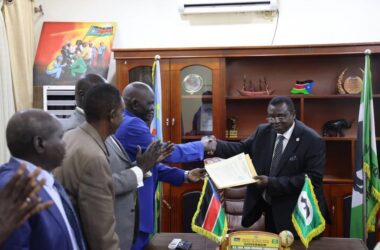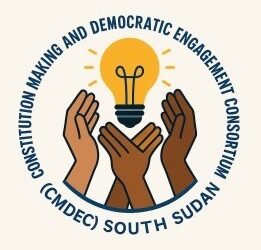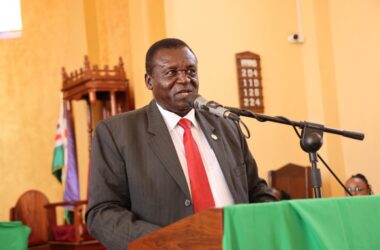By Peter Kuol Kuch
People living with HIV across South Sudan rippled in panic, fearing lack of support following cut of funding by United States Agency for International Development (USAID).
The move has severely impacted essential health services and access to life-saving antiretroviral drugs in a nation already heavily reliant on foreign assistance.
Shortly after Donald Trump won the U.S. presidential elections in 2024 and assumed office in January 2025, he began imposing significant global orders that stunned the world.
Upon his arrival in office, Donald Trump announced a swift and dramatic cut to most USAID funding for Africa, affecting both humanitarian and health sectors.
This order was not well-received. Many humanitarian organizations operating across South Sudan were impacted, leading to widespread layoffs due to shrinking funds.
The cuts affected not only the humanitarian sector but also most health service delivery. UNAIDS (IntraHealth) and other organizations have since called on the U.S. government to maintain its support for the global AIDS response and continue providing life-saving HIV programs.
According to the Ministry of Health in South Sudan, most health facilities operating under USAID funding across the country experienced partial shutdowns in early 2025.
The situation became dire for people living with HIV because antiretroviral therapy (ART) drugs, essential for treating HIV and suppressing the viral load, ran out in facilities due to a lack of funds.
The World Health Organization’s 2025 report estimates that approximately 140,000 adults and children in South Sudan are living with HIV.
However, following numerous appeals for U.S. support in South Sudan, USAID funds for HIV programs in the country were reportedly extended for three months, ending in June 2025.
HIV (Human Immunodeficiency Virus) is a virus that attacks cells crucial for fighting infection, making individuals more vulnerable to other infections and diseases.
It is primarily spread through contact with certain bodily fluids of an infected person, most commonly during unprotected sex or by sharing sharp objects.
Speaking to individuals living with HIV in Jonglei, Jackline, who agreed to be quoted using her first name, expressed that her life and the lives of her peers became “misery” when ARVs completely ran out in facilities in recent months.
“Like now, we feared everything was off. We feared that everyone may become sick and may die. Some of the clients remained at home; they stopped coming to the facilities because they heard there were no drugs,” she stated.
She explained that antiretroviral therapy helps sustain their health by suppressing the viral load, allowing them to contribute meaningfully to their families’ economies.
“Life is going to be hard on people living with HIV because there will be no drugs, no more support from the U.S. Now it’s a bit good because there are drugs available. We request the USA and other partners, including our government, to continue supporting this program.” Jackline emphasized their worry about the uncertainty of USAID funding and called for more support.
Simon Chol, chairperson for the Association for People Living with HIV in Jonglei State, acknowledged that with USAID support, they were able to train teams to sensitize the community about the dangers of HIV/AIDS and the importance of ARVs.
“Yes, what we experience here is that people have learned to live positively with the virus. There have been positive results between mothers who might have the virus and their children; children are being born without the virus when the mother has taken the drugs efficiently. Again, deaths have reduced—people who take drugs can live long,” he said.
Simon added that the USAID funding cut led to treatment interruptions for people living with HIV.
“When it was announced that the U.S. had suspended its support, it interrupted the treatment because some of our clients decided to stay at home. But the order reached us when we still had some balance of medicines. Up to now, it has contributed to IIT, which we call interrupted treatment.”
He fears that the rate of HIV infection will continue to spread in remote areas due to a lack of awareness and insufficient service delivery in Jonglei State.
Meanwhile, Abraham Malual, a counselor at the Bor Voluntary Testing Centre, stressed the consistently low turnout at the VTC in Bor, attributing it to inadequate awareness.
“Yes, there is willingness, but there is a lack of awareness in the community where people have not received information. The people who are coming to the VCT services now are those who have heard the risks of HIV. Otherwise, due to lack of funding, there is a lack of awareness in Jonglei State.”
He stated that residents are always willing to know their HIV status, but insufficient awareness campaigns persist due to a lack of support.
Although many funding streams are shrinking in South Sudan, residents still hope for the government of South Sudan to fill the remaining gaps left by partners to ensure continued effective service delivery.
Ajak Mach, the TB and HIV coordinator for Jonglei State, confirmed that the HIV center closed down when Donald Trump announced the U.S. funding cut for three months.
“Of course, when Trump’s order came out, our center here was shut down, and the staff who were working voluntarily with UNAID, which is IntraHealth, were not able to continue the work. From there, it caused a great effect in the community.”
Ajak appealed to the government of South Sudan to take up the responsibility of continuing to support HIV and TB programs across the country.
“They say it’s up to June, but I know what will happen after that. I think it will cause a problem with the community. You know, partners come in to fill the gap, but the responsibility is with us, the government. I think we can’t rely largely on the partners. If we continue like this, I think HIV will finish us in South Sudan. So we are appealing to the government to take over.”
He added that out of every 300 people attending services at facilities in Bor State Hospital, 3 percent are found to be HIV positive.
Since 2006, IntraHealth International has been working with partners in South Sudan, collaborating with the government to improve access to health services amid conflict and disease outbreaks, and providing high-quality HIV/AIDS services.
Through a USAID-funded program known as “Advancing HIV & AIDS Epidemic Control Activity,” IntraHealth provides comprehensive HIV services to the general public and key populations to prevent HIV transmission. According to IntraHealth South Sudan’s June 2024 report, “14,862 people living with HIV, including 4,338 female sex workers, had been supported on ART.”




